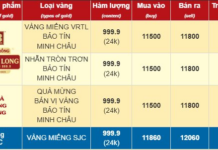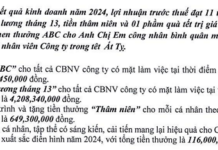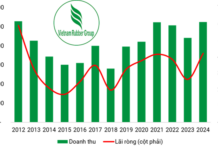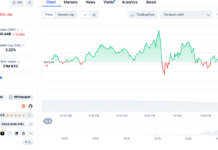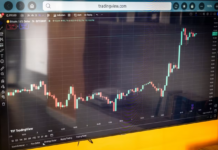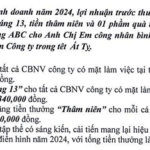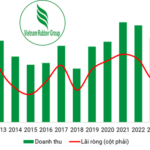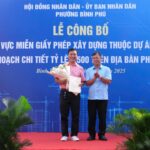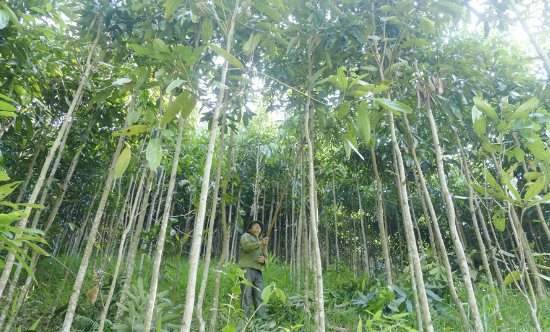The Institute of Agricultural and Environmental Policy and Strategy (ISPAE), under the Ministry of Agriculture and Environment, reported that during the “A Day Without Plastic Bags in Vietnam 2025” campaign held earlier in July, retailers in Hanoi reduced the use of over 62,000 plastic bags, equivalent to nearly 550 kg.
Retailers also replaced non-biodegradable bags with eco-friendly alternatives, offered promotions to encourage customers to bring their own bags, and raised awareness about sustainable consumption.
INTEGRATING CIRCULAR ECONOMY PRINCIPLES INTO RETAIL, STARTING WITH PLASTIC WASTE REDUCTION
Building on the success of the campaign, on July 31, 2025, the Institute of Agricultural and Environmental Policy and Strategy (under the Ministry of Agriculture and Environment) collaborated with plastic waste reduction partners to organize a discussion session titled “Promoting Circular Economy in the Retail Sector.” The event aimed to facilitate dialogue on adopting circular economy practices within the retail supply chain and share practical experiences in promoting circular economy models.
The Bag Free World initiative has designated July 3 as International Plastic Bag-Free Day to encourage consumers to reduce plastic bag usage and promote environmentally friendly solutions globally.
Since 2023, the Institute of Agricultural and Environmental Policy and Strategy has been coordinating with partners and retailers to organize various activities to observe International Plastic Bag-Free Day.
This year’s campaign was led by the Alliance of Retailers for Nylon Bag Reduction, with the participation of 16 major companies, including Central Retail, Lotte Mart, Aeon Vietnam, Coopmart, MM Mega Market, and TH True Mart.
The trends of sustainable development, green growth, and the circular economy are presenting vast opportunities for the retail sector. This sector plays a crucial role in driving the transition to a circular economy by adopting low-emission, clean technologies, and modernizing the supply chain.
Retailers have proactively replaced non-biodegradable bags with eco-friendly alternatives and launched promotions to encourage customers to bring their own bags. They have also actively raised awareness about sustainable consumption. Notably, some prominent activities include Central Retail’s “Month Without Nylon Bags” in Hue, AEON Vietnam’s “Sort Fast, Shop Green, Reduce Waste” program, and the installation of a message tree at their supermarket. Meanwhile, Co.opmart offered discounts to customers using reusable bags, and TH True Mart organized an art exhibition and photo shoot with a green theme.
At the discussion session, Ms. Tran Thi Hong Hanh, representing the Environment Agency, shared that the green transition must be driven by two factors: technology and mindset. Using recycled products is the most reasonable solution at present, as the use of biodegradable packaging has not significantly changed mindsets nor gained a competitive advantage in terms of cost for retail businesses. Using reusable bags and packaging will create a small action with a significant impact by reducing the amount of waste released into the environment, regardless of whether it is biodegradable or not.
However, according to Ms. Hanh, there are two groups of products under consideration for labeling: biodegradable packaging and packaging using recycled plastic pellets. While biodegradable packaging is environmentally beneficial, its high cost poses challenges for businesses in transition. “Therefore, when establishing criteria for the green label, it is necessary to consider both market factors and practical applicability,” emphasized Ms. Hanh.
According to the delegates, by 2030, Vietnam has the potential to become a new hub in the trend of restructuring global supply chains, especially as multinational companies strive to reduce their dependence on international markets. This development will not only boost digital economic growth but also deepen the integration of the retail sector into the global value chain.
The trends of sustainable development, green growth, and the circular economy are presenting vast opportunities for the retail sector. This sector plays a crucial role in driving the transition to a circular economy by adopting low-emission, clean technologies, and modernizing the supply chain.
OPPORTUNITIES FOR RETAIL BUSINESSES TO EMBRACE THE CIRCULAR ECONOMY MODEL
Dr. Nguyen Trung Thang, Deputy Director of ISPAE, stated that Vietnam has demonstrated strong commitments to promoting the circular economy. Notably, the development and implementation of policies related to the circular economy have gained increased attention and been identified as a key task in striving for sustainable development goals. Specifically, the Law on Environmental Protection, passed by the National Assembly on November 17, 2020, dedicates Article 142 to regulating circular economy development.
To effectively implement the provisions of this law, on January 10, 2022, the government issued Decree No. 08/2022/ND-CP, stipulating criteria, roadmaps, and mechanisms to encourage circular economy models. Notably, Decision No. 222/QD-TTg, dated January 22, 2025, by the Prime Minister, approved the National Action Plan for the Circular Economy. This plan outlines strategic orientations and priorities for developing the circular economy in key sectors and fields.
Additionally, Vietnam has promulgated various legal documents to control plastic waste and promote sustainable production and consumption. These include the National Strategy for Comprehensive Solid Waste Management until 2025, with a vision towards 2050; Directive No. 33/CT-TTg dated August 20, 2020, by the Prime Minister, on enhancing the management, reuse, recycling, treatment, and reduction of plastic waste; and Decision No. 1316/QD-TTg dated July 22, 2021, by the Prime Minister, approving the Project to enhance plastic waste management in Vietnam, which sets specific goals and targets for reducing plastic waste generation.
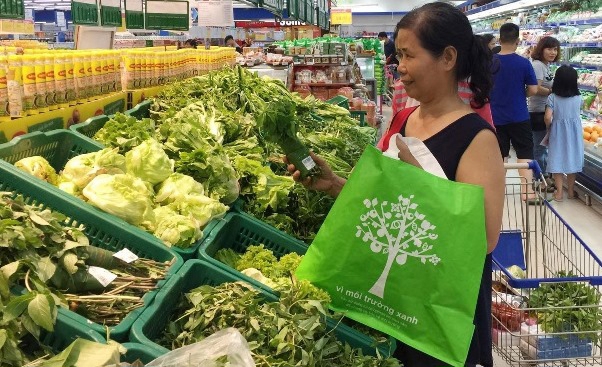
At the local level, the Hanoi People’s Council recently issued Resolution No. 22/2025/NQ-HDND dated July 10, 2025, regulating measures to reduce plastic waste generation in the city.
According to the representative of the Hanoi Department of Agriculture and Rural Development, to implement Resolution 22/2025/NQ-HDND, the city is developing a plan to investigate and assess plastic waste generation from production activities within its jurisdiction.
The plan aims to control the input materials in the production process, eliminate outdated and environmentally harmful technologies, and encourage the adoption of technologies that enable resource recovery and recycling. Hanoi also mentioned several incentive mechanisms for businesses investing in the production of alternatives to single-use plastics.
According to the representative of the Environment Agency, Vietnam has introduced numerous policies to encourage the use of eco-friendly packaging by commercial companies. These include policies to encourage environmentally friendly production and consumption, the National Green Growth Strategy, and the National Action Program for Sustainable Production and Consumption.
“With the strong commitments made by retail businesses and the collaboration of partners in plastic waste reduction, we will collectively contribute to national, regional, and global efforts in the journey towards a global treaty to end plastic pollution,” emphasized Mr. Thang.
The Green Industrial Revolution: Businesses Can’t Go It Alone
The green transition in industrial production requires an accompanying ecosystem of aligned policies, green financing, suitable technology, and collaboration between stakeholders.
Record-Breaking Profits for the Rubber Group Since 2012
The fourth-quarter rubber price surge helped Vietnam Rubber Group JSC (HOSE: GVR) achieve its highest revenue and profits in over a decade.
Unblocking Bottlenecks for a Nation’s Economy to Soar.
In 2025, the government is targeting a GDP growth rate of over 8%, with aspirations to reach double digits should favorable conditions prevail. Economic experts believe that Vietnam’s growth potential is evident, but it is currently hindered by certain regulatory and administrative bottlenecks. To achieve the desired economic acceleration, it is imperative to address and unblock these constraints.






